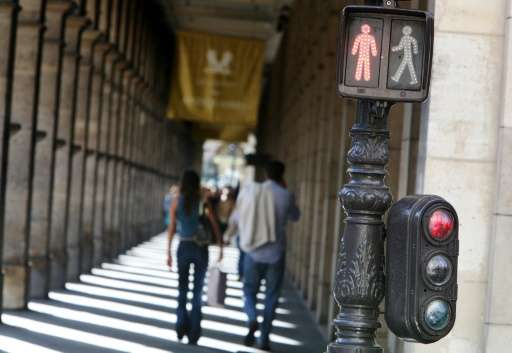French pedestrians see green light, even when it's red: study

French pedestrians have the reputation of being a law unto themselves—but an unusual study has provided some scientific backing for the stereotype.
Four times out of 10, French pedestrians cross the road when the lights are against them, according to a paper published on Wednesday.
In disciplined Japan, though, the rate is 20 times lower.
Cedric Sueur of Strasbourg University in eastern France led a team that analysed behaviour at three pedestrian crossings in Strasbourg and four in the Japanese city of Nagoya.
The researchers recorded 3,814 crossings in Strasbourg and 1,631 in Nagoya.
The rulebreaking was vastly different between the two countries—in France, 41.9 percent of crossings took place against a red light, but this was just 2.1 percent in Japan.
Men and young people aged 20-30 were more inclined than women and older people to cross illegally.
Different degrees of social conformity explain the gap in behaviour between the two countries, researchers reported in the journal Royal Society Open Science.
"The French have less respect for the rules... We are less concerned with social approval," Sueur told AFP.
"It's not that the fear of a ticket is bigger in Japan than in France. It's that people (in Japan) are more concerned about the opinion of others."
The role of group behaviour on pedestrian traffic is a major factor in safety, the study found.
Such research "could help target specific preventive, culture-specific solutions for pedestrian safety," it said.
According to the World Health Organization (WHO), nearly 300,000 pedestrians lose their lives on the road every year.
More information: Cultural influence of social information use in pedestrian road-crossing behaviours, Royal Society Open Science, rsos.royalsocietypublishing.or … /10.1098/rsos.160739
Journal information: Royal Society Open Science
© 2017 AFP



















